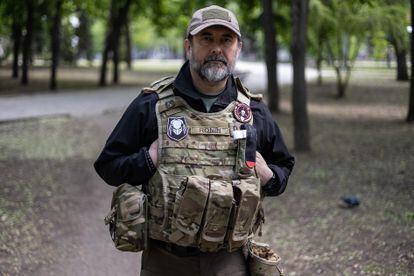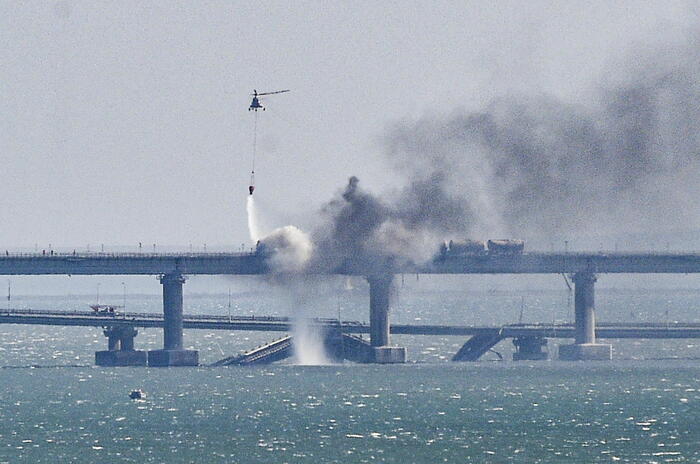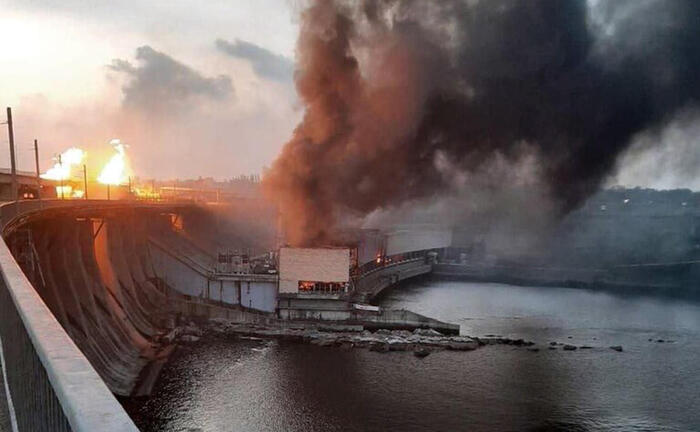A huge crater caused by a bombardment devoured Tatiana Yelicheva's house in Rubizhne a few weeks ago.
Russian attacks hardened on the Lugansk front, leaving her city and neighboring Severodonetsk, a major industrial center in eastern Ukraine, on the front lines.
The attack shook her life.
She left all her memories behind her, including her four cats, and left with what she was wearing, she tells in Spanish with a soft accent, from her time as a Soviet student in Cuba.
Now Rubizhne is under Russian control and Yelicheva lives in a shelter in Lisichansk, also hit by indiscriminate bombing and in the path of the Kremlin's offensive to take over Donbas, the area of eastern Ukraine where the fiercest fighting in Ukraine is now centered. the war launched by Russia and that is going to be three months with no end in sight.
Russia has turned this region into a “hell”, as the Ukrainian president, Volodímir Zelenski, has denounced.
The area, already badly hit by the 2014 war between the Ukrainian army and pro-Russian separatists managed by Moscow, who have served the Kremlin as an argument and screen to launch the invasion, is "completely destroyed," the president said in his evening speech. from Thursday.
“All this does not have and cannot have a military explanation for Russia.
It is an attempt to kill as many Ukrainians as possible, destroy as many houses, facilities and businesses as possible," Zelensky added.
More information
Last minute of the war, live
Bloody attacks by Kremlin forces have killed 20 people in the eastern provinces of Donetsk and Luhansk in the past 24 hours, according to the kyiv government.
There are 50 people injured in these latest bombings against 45 towns in Donbas, according to official data, which also counts attacks against 23 Ukrainian positions.
The Moscow troops, who initially wanted to encircle the kyiv forces in a large area of Donbas with a large pincer movement, are now trying to advance from three points to encircle the Ukrainian positions in the area in small circles.
And it is in the Lugansk region that the toughest battles and the bloodiest attacks are taking place.
It's also where Moscow is making some — albeit faltering — gains preceded by brutal attacks, according to the Kremlin's playbook of razing an area, then occupying it.
As in Rubizhne, the home of Tatiana Yelicheva.
Or in Bilohorivka, where a bombardment demolished the last refuge in the town, leaving 60 people under the rubble, according to the authorities.
And in Mariupol, the city on the Sea of Azov in Donetsk province, which has become the symbol of Russia's devastating attacks and is already under full control of Moscow.
Russia has sold it as a great victory to take over a city that it has previously laid waste to.
During the last 24 hours, artillery fire has killed 15 civilians in the city of Severodonetsk - the most important of Lugansk under Ukrainian control -, according to regional authorities.
Among them, three people who took refuge along with 200 other civilians in a school in the town, around which the bombings have intensified.
On the outskirts there are already street-to-street fights between the Russian and Ukrainian armies.
Severodonetsk (about 100,000 inhabitants before the invasion) has been without water, gas and electricity for weeks.
There is also no phone line or internet.
Those who have stayed, like Vera, cook over fires in neighbors' patios, with firewood cut from gardens and parks.
“Some shoot out and others back.
And we are in the middle”, says the woman with a tired gesture at the gates of the school, which has now become her home, like that of so many others who huddle in the basements of buildings under bombs.
With the city short of supplies, without transportation, and under the constant rattle of artillery, Vera and her family, including her six-year-old granddaughter, rely heavily on the help of volunteers who, like Andri and his partner, Lena, risk their lives. to bring them food packages, basic products;
also to try to evacuate those who want to leave.
Serhii Haidai, governor of Lugansk, in a park in Bakhmut, on May 13. Albert Garcia (EL PAÍS)
They are not that many, Lena commented a few days ago, on one of her last trips to the area before the attacks became even more intense and followed and the bombardments also intensified against the road that connects — like an umbilical cord — Severodonetsk with the city of Bakhmut, some 70 kilometers below, in the Donetsk region, now the
de facto
head of the area and which is one of the next circles in Putin's target.
Many of those who have stayed in Severodonetsk or Lisichansk believe, like Vera or Tatiana Yelicheva, that they have nowhere to go or do not have the strength to start over, they suffer from health problems;
or they just don't mind living under Russian occupation if that time comes.
Some 45,000 people remain in Lugansk province out of a population of some 900,000 before the invasion, according to data from the regional governor and military authority of the province, Serhii Haidai.
Haidai himself has left his house, although for reasons other than those fleeing bombs.
Now the governor of Lugansk changes places almost every night.
One, in a basement;
another, in a hotel.
Or in an Administration building.
Russia put a price on his head.
Like other public servants, he is on the blacklist of the Kremlin, which from the beginning of the invasion has wanted to behead the Administration and install a puppet government.
At all levels.
Haidai is at risk of kidnapping.
Or something much worse.
So she lives on the move.
And very protected.
After a couple of Skype conversations, the governor of the region hardest hit by the second phase of the Russian offensive against Ukraine arrives for the interview in a park in the city of Bakhmut aboard a white armored van, like those that transport the money to banks.
He always moves with an escort, he wears a bulletproof vest, a flat cap and a military uniform.
One with his alias embroidered on the chest:
Ronin
, as the wandering Samurai, the wandering man.
In the first days of the invasion, Haidai received calls from Russian phone numbers.
The voice on the other end offered to change sides.
Collaborate with a "new Administration" at the service of Moscow.
One of the last times, before finally blocking the calls, the governor of Lugansk responded with an expletive.
By then the phrase that one of the Ukrainian soldiers guarding the island of snakes, in the Black Sea, released to the Russian ship that urged them to surrender had already become mythical.
"Russian ship, fuck you."
And so Haidai said to the voice on the other end of the line.
Or so the governor says.
After huge failures on other fronts and being forced to withdraw from the Kharkov belt (the country's second largest city) due to the push of the Ukrainian forces, the Kremlin is reinforcing the Donbas front, explains Commander Almas in a trench on the outskirts of Severodonetsk.
Reports from British espionage and the Institute for the Study of War confirm that after the fall of Mariupol's Azovstal steelworks, the last focus of Ukrainian resistance in the port city, many of the troops occupied there are moving north to the region.
Moscow now has two fundamental fronts in Donbas: Izium, a key city for its logistics and from which it tries to advance towards Sloviansk and Kramatrosk, in Donetsk;
and that of Lugansk.
It is in the latter where it is managing to make some (albeit dubious) progress, but also significant losses.
A few days ago, Ukrainian special forces razed to the ground a pontoon bridge that Kremlin soldiers had built to cross the mighty Siverski Donets River.
A few dozen soldiers and several armored vehicles managed to cross it, but the Ukrainian attack destroyed not only the bridge, but also wiped out an entire tactical battalion.
One such group usually has about 1,000 soldiers.
In the Lugansk province, 80% of the cities are "completely destroyed", says Governor Haidai.
“After the setbacks it has suffered and the resistance of the Ukrainian Army, Russia is dedicated to attacking our positions and our cities with all the weapons at its disposal.
And that includes artillery, mortars, tanks, jet fire systems, and aircraft.
And he does it every day, without exception,” says the governor.
Since 2014, Moscow has already controlled a good piece of Lugansk territory through the pro-Russian separatists;
it now dominates around 90% of the province.
And the rest besiege him.
Like the cities of Lisichansk or Severodonetsk.
Follow all the international information on
and
, or in
our weekly newsletter
.
Exclusive content for subscribers
read without limits
subscribe
I'm already a subscriber







/cloudfront-eu-central-1.images.arcpublishing.com/prisa/FFWXS6VW4ZGBFA57FSERWDIBKA.jpg)



/cloudfront-eu-central-1.images.arcpublishing.com/prisa/KMEYMJKESBAZBE4MRBAM4TGHIQ.jpg)


